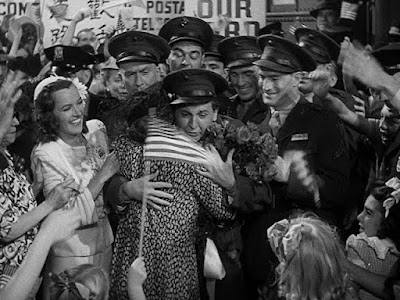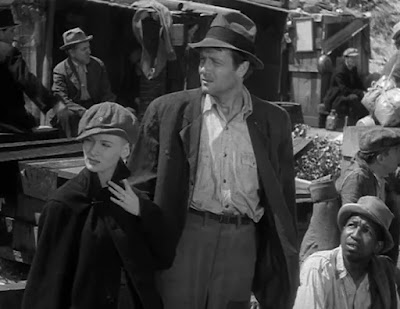Censors. It may seem odd in this "anything goes" era of film-making—where even dismemberment gets a pass for 13 year olds (but bare breasts get an "R"), where the foulest of epithets are uttered from the mouths of babes and fart jokes are de rigueur in kids' movies—that at the time this movie was made, you couldn't say the word "pregnant," or "virgin," men and women could not appear in the same bed, the subject of sex was merely metaphorical (as opposed to mythical in a teen movie) and represented by a camera pan to crashing ocean waves, burning fires, or shattered mirrors.
Yes, kids, we were Amish back then. At least, actresses weren't asked to wear veils...unless they were over 40 and the vaseline on the lens didn't hide the crow's feet.* In this the script is an intricate little puzzle of studio "issues" that interlock to form a script that should have raised so many red-flags (and did), but take any of them out of the story and it would look like you were unpatriotic, immoral, or a perfect candidate for ex-communication.
Of course, it's a comedy. Set and produced during war-time. And the sacred subjects of that war—God, Country, and The Troops—are all given a jaundiced eye that would come from living with a bellyful of bromides while just trying to eke out a living. Though clear-eyed and sentimental in the right places, The Miracle of Morgan's Creek can look at a manufactured convenience and still call it "bologna," and then acknowledge that, sometimes, bologna'll do the job. Even the movie poster has a conspiratorial wink in it. Like any good love story.
Poor Norval Jones (Eddie Bracken). He's been in love with Gertrude Kockenlocker (Betty Hutton) since they were kids, and he's got it bad. "I wish you were in a lot of trouble, Trudy, so I can help you."
Note to Norval: You, uh...you've REALLY got to be careful what you want. Especially when it comes to Trudy. She's only got eyes for the servicemen going overseas. She wants to do her part for our "fine and clean young men" and to give 'em a good time before they go off to war, over the objections of her constable father (Sturges pillar William Demarest). He forbids her to go to the USO dance on Tuesday, because as a veteran of The War to End All Wars, he knows servicemen have their minds on only one thing. "Oh no," says Trudy. "They're not like that any more! These are good boys, noble boys." But Pappy is unconvinced. So she conspires with Norval to take her to the movies, and once there, she dumps him, takes his car, and does a pub-crawl with the "nice boys," telling Norvel she'll meet him back at the flicks at 1:15.She doesn't make it back until 8:00 am, with the car in tatters, her memory a little shaky, and Norval in the Kockenlocker gun-sights to take the blame when they get her home. With legitimate reasons.
Or even illegitimate ones.
Evidently, she did more than her part for the troops. Trudy doesn't remember a lot about what happened that night, it's kind of a blur. She thinks she might have gotten married, but she's not sure—she can't remember the guy's name. So, she keeps it to herself—the boys are shipping out, who'll know? Then, there's the little matter of her being pregnant. So, there's a double puzzle: she can't tell anybody she's married without a husband, but she's pregnant without ever having been married. Maybe. What to do, what to do?
It's a scandal. The kind that small towns hush up and don't talk about; but what fun would that be? There's a way out of the problem—don't even go there—but it can't go smoothly, and before the solution can be found, it has to get more complicated—at the top of its lungs. It even turns political, with guest appearances by The Great McGinty (Brian Donlevy) and "The Boss" (Akim Tamiroff), from Sturges' directorial debut.
In 2001, The Miracle of Morgan's Creek was selected for the National Film Registry. This American classic is also #54 on the AFI's "100 Years...100 Laughs" list of the funniest movies ever made. And it's somewhere near the top of the most boldly audacious movies ever created in a climate of repression. Add the caveat of taking such subversive gleefulness in its presentation, and it would be #1.
* It should be noted that once the Breen Office died the death of a thousand indignities in the late '50's and 60's, and subject matter was freed up for public consumption, There have been waves of motion picture permissiveness—we approach a line of the verboten and then back off, a few years later we creep up to the line and slink back in a cycle that seems more like evolution than revolution. There is still censorship, but the censor is the marketplace, and a film-maker must consider the box-office potential of his choices, as filtered by the specious and contrary dictates of the MPAA. Except for the screw-balls at the Ratings Board, it seems a more fair system: "Yeah, you can do that...but it's gonna cost ya."














































